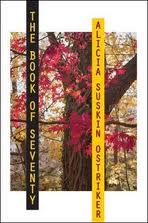Book Review
The Book of Seventy by Alicia Suskin Ostriker, University of Pittsburgh Press, 2009. $14.95
Reviewed by Moira Richards
I may be wrong, but from the book’s cover photo, Alicia Ostriker doesn’t look the type of septuagenarian who sits on her porch rocker and reminisces to all who drop by. And indeed, although much of the collection’s poetry is written in thoughtful, leisurely couplets and triplets, the content immediately proves the vigour evident in the author photo:
Please, I thought, when I first saw the paintings
de Kooning did when Alzheimer’s had taken him
into its arms and he could do nothingbut paint, purely paint, transparent, please let me
make beauty like that…
("Approaching Seventy")
Ostriker divides her Book of Seventy into four untitled, numbered parts and begins with a long, three-part, eight-page poem that explores the various aspects of being near the end of a long life. She begins by finding the beauty in the approach of death:
1. Sit and watch the memory disappear
romance disappear the probability
of new adventures disappearwell isn’t it beautiful
when the sun goes down
don’t we all want to be where we can watch itredden
sink to a spark
disappear
("Approaching Seventy")
She continues, however, to conjure its spectres:
I come from visiting my once-blonde
friend in hospital with non-Hodgkin’s
lymphoma the chemo is working
("Lymphoma")
This poem develops, despite the narrator’s best efforts at optimism and ‘normality,’ into a nightmare of the future she cannot escape. It’s the calm, sober narration of these poems of scary stuff that reach deepest into me. Then, further on, with poetry of understated matter-of-factness, there is some reassurance from the dead:
Honey, you say in your old whiskey
and cigarette voice you had the good fortune
to retain when you stopped smoking and being a drunk
don’t worry about a thingbeing dead is okay, then you melt
into the rain
("Late Winter Rain")
After these ambivalent encounters with aging and the prospects of dying, the collection moves to its second section—which segues from poetry of sex and passion and of remembered long-gone encounters—to the third, paeans that celebrate the voracious appetites of those immortals, the gods.
Unrepentantly, "Apollo to Marsyas" who had dared challenge the god to a musical contest—and lost:
I had the right to flay you
for your hubris
satyrthey applauded when I nailed your hide
to a tree by the river Meander
for cruelty is intrinsic to art
From "Artemis to Aphrodite," the defiant taunt
sister you have not lived
until you have gutted a deer
and thrown it guts
to the dogs
And from "Persephone to Demeter": unrepentant and truculent daughter who broke her mother’s heart because
you understand nothing
of the rapture of liberty…
it was cool going down those iron stairs
then warm and with a breezewith a faint tinge of smoke
or was it possibly gunpowder…
A person lives a lot of history in seven decades. The last section of "The Book of Seventy" looks back at fascism, its spread and effect in Europe, and how
the book of Job came true
the millions and the millions disappeared
("Listening to Public Radio")
This poetry looks too, at our world today (disappointment and dismay loud in the quietude of their narration) in a poem entitled, "Laundry," at modern
hooding, waterboarding, rendition. The bleaching of the news. The rinsing and spinning…"
Sometimes the poetry is of despair; despair for the actions of some of the people, of some of the peoples—evidence that history may be learned but is too rarely learned from:
If you are a victim you must be innocent
If you are innocent you cannot be guilty
If a nation is like a person
If a person is like a devil
Whiteness falling through blackness forever and ever.
("The Snowfall")
But at the end, the poet heeds the injunction of the drone in her head; to
gather grief like straw
spin it into something like gold
("Drone")
First, a wonderful twelve-part sequence of unrhymed triads, "Almanac," in which each part celebrates a month of the year—May’s rambunctiousness:
Now May cries out again, I’m here, I’m here
until tulips roar like lions, daffodils scream like witches
robins puff their chests out, sumptuous maples shout…
gives way to August’s Orange moon lifts… and in October, oh in October, the wry fate of Our elegant Japanese maple… I’d love to have been able to quote every one of these gorgeous twelve months, each so beautiful in its own distinctive way…
Alicia Ostriker closes this meditation on seventy years of living with Ars Poetica: Three Poems, the third of which returns to the painterliness of the start. Now, not only an aging, ailing Willem de Kooning but a trio of feisty masters summoned to cheer the narrator on
Matisse, too, when the fingers ceased to work
worked larger and bolder, his primary colors celebrating
the weddings of innocence and glory, innocence and glory
Monet when the cataracts blanketed his eyes
painted swirls of rage, and when his sight recovered
painted water lilies, Picasso claimed
I do not seek, I find, and stuck to that story
about himself, and made that story stick.
Damn right. We are talking about defiance.
As do I.
Moira Richards lives in South Africa and hangs out here: http://www.darlingtonrichards.com and here: http://www.redroom.com/author/moira-richards. She, with Norman Darlington of Ireland, edits and publishes the annual Journal of Renga & Renku.


